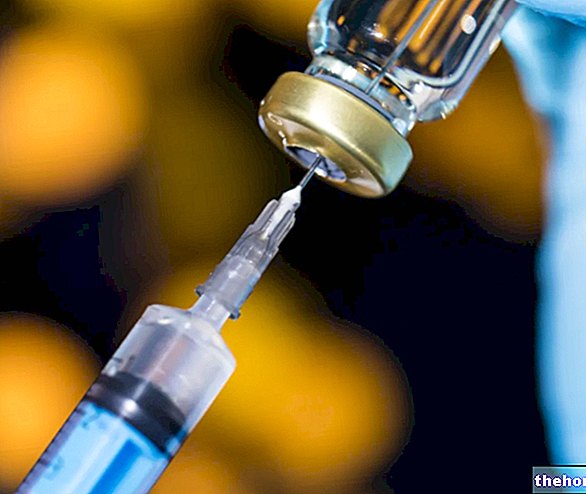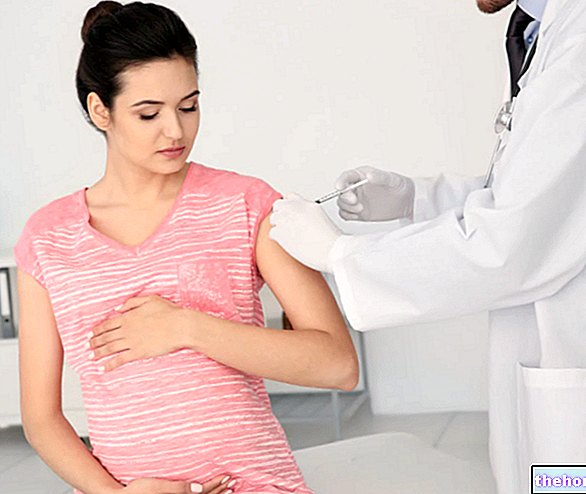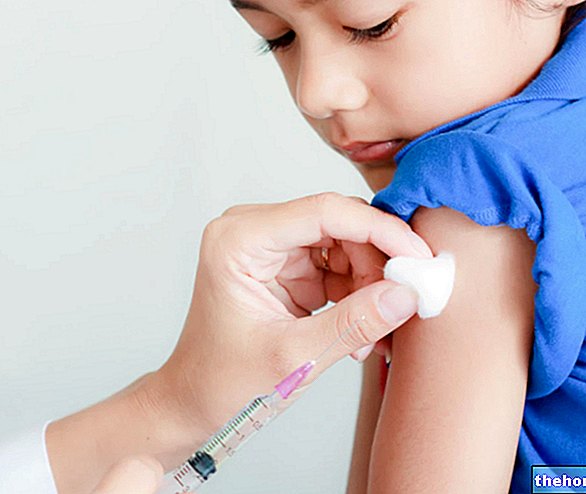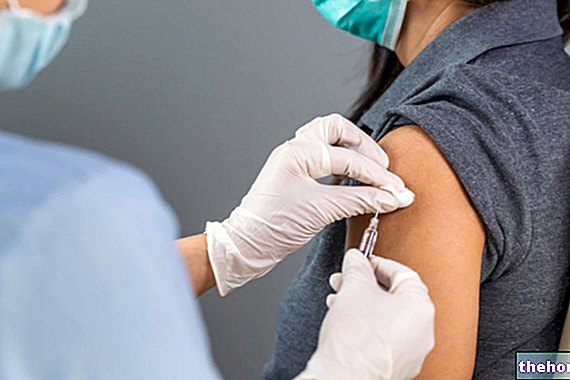This article is dedicated to the developmental age vaccines expected in the first 12 months of life; the topics covered will be: the infectious agents against which the various vaccinations are aimed, the type of vaccine, the methods of administration, the dosages, the vaccination schedule of each dosage, the possible risks, any contraindications and many other useful information for parents curious to learn more about the topic.
What are Vaccines: a brief review
Before analyzing vaccines in infants in detail, it is necessary to review in broad terms what a vaccine is.
A vaccine is a pharmacological preparation, which can be administered parenterally or orally, which allows to create an "immunization against one or more specific pathogenic microorganisms (N.B: the most common pathogenic microorganisms are viruses and bacteria).
Vaccines may contain an attenuated form of the pathogen against which immunization is desired, or they may contain proteins or toxins deriving from this same pathogen.
There are three major types of vaccines:
- Live attenuated vaccines. They contain the microorganisms against which immunization is to be obtained in a live form, but with a reduced pathogenic power.
- Inactivated vaccines. They contain a complete but dead (therefore inactive) form of the microorganisms against which immunization is desired.
- Vaccines with purified antigens. They contain, in inactivated form, proteins, toxins or polysaccharides of the microorganism against which the recipient individual is to be immunized.
Vaccines act by activating the immune system: with their administration, in fact, they stimulate the immune system to produce antibodies, which are the real architects of immunization.
Vaccines do not have an immediate effect: the antibody response, in fact, requires a period of time ranging from 2 to 4 weeks.
B, the anti Haemophilus influenzae type B, the conjugated anti pneumococcus, the anti meningococcus B and the anti rotavirus.However, it should be noted immediately that the anti diphtheria, anti tetanus, anti pertussis, anti poliomyelitis, anti hepatitis B and anti Haemophilus influenzae type B are typically grouped in a single preparation, called a hexavalent vaccine; this implies, therefore, that the number of vaccinations to which a newborn is actually subjected is only 4: the hexavalent vaccine, the pneumococcal conjugate vaccine, the meningococcal B vaccine and the rotavirus vaccine.
Vaccines in Newborns: Which Are Obligatory and Which Are Recommended?
Among the vaccines given to newborns, the anti diphtheria, anti tetanus, anti pertussis, anti poliomyelitis, anti hepatitis B and anti Haemophilus influenzae type B (essentially the hexavalent vaccine), while the meningococcal B, pneumococcal and rotavirus vaccines are recommended but not mandatory.
at the level of the latero-superior portion of the thigh.
Hexavalent Vaccine Calendar
According to the vaccination schedule, the 3 dosages of hexavalent vaccine in newborns are provided for:
- The first at the beginning of the 3rd month of life (61st day of life or 2 months of life plus one day);
- The second at the beginning of the 5th month of life (121th day of life or 4 months plus one day);
- The third between the 11th and 13th month of life (generally, it is placed in the 12th month of life).
Important
While vaccinations against hepatitis B and Haemophilus influenzae type B terminate at the 12th month of life, those against diphtheria, tetanus, pertussis, poliomyelitis are subject to recall; to be precise, there is a recall between 5 and 6 years of life and a recall between 14 and 15 years of life for diphtheria, tetanus, pertussis and polio, and a recall every 10 years, starting from 15 years of life , only for diphtheria, tetanus and pertussis.
Anti Diphtheria Vaccine
In the diphtheria vaccine, the substance useful to evoke the immune response is the so-called diphtheria toxoid.
Diphtheria is a serious contagious disease caused by the bacterium Corynebacterium diphtheriae, which, in addition to causing severe inflammation of the respiratory tract, can also cause damage to the nervous system, heart and kidneys.
Anti Tetanus Vaccine
In the tetanus vaccine, the substance useful to evoke the immune response is the so-called tetanus toxoid.
Tetanus is a serious, non-contagious infectious disease produced by the spores of the bacterium Clostridium tetani, which affects the central nervous system and produces muscle spasms capable of causing respiratory failure.
Pertussis vaccine
In the pertussis vaccine, the substance useful to evoke the immune response is more than one: pertussis toxoid, filamentous hemagglutinin and pertactin.
Whooping cough is a contagious infectious disease caused by the bacterium Bordetella pertussis, which triggers coughing fits so severe that, in very young children, they can lead to death from shortness of breath.
Anti Poliomyelitis Vaccine
In the polio vaccine, the substance useful to evoke the immune response is more than one: the inactivated poliomyelitis viruses PV1, PV2 and PV3.
Polio (or simply polio) is a serious and contagious infectious disease caused by the Poliovirus virus, which can have major repercussions on the central nervous system.
Hepatitis B vaccine
In the hepatitis B vaccine, the substance useful to evoke the immune response is the so-called recombinant surface antigen.
Hepatitis B is a dangerous contagious infection due to the HBV virus, which damages the liver.
Did you know that ...
In those born to a mother positive for hepatitis B antigen, the first dose of hepatitis B vaccine is administered already 12-24 after birth.
Anti Haemophilus influenzae type B vaccine
In the anti vaccine Haemophilus influenzae of type B, the substance useful to evoke the immune response is the so-called polysaccharide derivative of Haemophilus influenzae.
Haemophilus influenzae type B is a contagious infectious disease, caused by the homonymous bacterium, which, in very young subjects, can cause forms of meningitis, pneumonia, pericarditis, osteomyelitis or septicemia.
and septic arthritis with severe and sometimes fatal consequences.The pneumococcal conjugate vaccine currently in use in infants (or 13-valent PCV) is a vaccine with purified antigens, whose essential ingredients for obtaining the desired immunization are:
- An inactivated polysaccharide antigen belonging to the capsule of the pneumococcal bacterium e
- An inactivated protein derived from diphtheria toxin, the purpose of which is to increase the antibody response to the previous ingredient.
The pneumococcal conjugate vaccine for newborns creates an immunization against the 13 pneumococcal strains responsible for more than 80% of juvenile infections related to this bacterium; this explains why it is also called 13-valent PCV.
It should also be noted that the conjugated pneumococcal vaccine for newborns has been replacing, for some years now, an old formulation, which protected against 7 strains of pneumococcus, and should not be confused with the version indicated for children aged 2 and up, adolescents. and to adults, a version that immunizes against as many as 23 different strains of pneumococcus (23-valent PCV).
Administration of the Conjugated Pneumococcal Vaccine
In newborns, the administration of the conjugated pneumococcal vaccine is divided into 3 doses and takes place parenterally, through an "intramuscular injection at the level of the latero-superior portion of the thigh.
Conjugated Pneumococcal Vaccine Calendar
According to the vaccination schedule, the 3 dosages of conjugated pneumococcal vaccine in newborns are provided:
- The first to the 3rd month of life;
- The second to the 5th month of life;
- The third between the 11th and 13th month of life.
The pneumococcal conjugate vaccine for infants can be given in conjunction with other vaccinations; in this regard, it often happens that its implementation coincides with that of the hexavalent vaccine.
, known to be one of the main causative agents of two very serious infections with a high mortality rate, especially in the youngest: meningococcal meningitis and meningococcal sepsis.
The meningococcal B vaccine is a vaccine with purified antigens, the fundamental ingredients of which to obtain the desired immunization are:
- Three typical proteins found on the surface of all subtypes of Neisseria meningitidis (neisseric adhesin A, factor H binding protein and neisseric heparin binding antigen) and
- The outer membrane, reduced into vesicles, of the meningococcus B.
Administration of the Anti Meningococcal Vaccine B
In infants, the administration of the meningococcal B vaccine is divided into 2 or 3 dosages (the precise number depends on when the vaccination cycle begins) and takes place parenterally, by means of an "intramuscular injection at the level of the latero-superior portion of the thigh. .
Anti Meningococcal Vaccine Calendar B
For babies under 6 months of life, the administration of the meningococcal B vaccine involves 3 dosages, the first of which is generally at the 3rd month of life and the following one month after the previous one.
For newborns who just have exceeded 6 months of life, on the other hand, the administration of the meningococcal B vaccine requires only 2 dosages, the first of which generally at the 7th month of life and the second within the following two months.
It is important to note that the meningococcal B vaccine cannot be administered together with other vaccines and that at least 15 days must always elapse between its implementation and that of another vaccine.
Important
Meningococcal B vaccine is subject to booster.
For infants undergoing the 3-dose administration cycle, the recall is expected between the 12th and 15th month of life; for infants subjected to the 2-dose administration cycle, on the other hand, the recall is expected no later than the 2nd year of life.
What makes rotavirus dangerous is the possibility that, in the youngest (such as infants just a few months old), it determines a state of dehydration such as to cause complications that are sometimes fatal for the patient.
The rotavirus vaccine is a live attenuated vaccine; it therefore contains a live but weakened share of rotavirus.
Live attenuated viruses contain a bland, laboratory-obtained version of the pathogenic microorganism; this means that they are able to activate the antibody response at the price of a very mild, sometimes often asymptomatic version of the related disease.
Administration of the Anti Rotavirus Vaccine
In infants, the administration of the rotavirus vaccine is divided into 2 or 3 dosages (the precise number depends on the type of vaccine preparation used) and takes place orally, through a special applicator with plunger.
Anti Rotavirus Vaccine Calendar
If the 2-dose vaccine preparation is used, the cycle of administration of the rotavirus vaccine should end at the latest at the 24th week of the neonate's life and should adhere to the following schedule:
- The first dose between the 6th and 12th week of life (usually done at 2 months);
- The second dose at least 4 weeks after the first (usually performed at 4 months).
If, on the other hand, the 3-dose vaccine preparation is used, the cycle of administration of the rotavirus vaccine must end at the latest at the 32nd week of life of the newborn and must respect the following schedule:
- The first dose between the 6th and 12th week of life (usually done at 2 months);
- The second dose at least 4 weeks after the first (usually it is done at 4 months);
- The third dose at least 4 weeks after the second (usually done at 6 months).
Rare, if not very rare, adverse effects of vaccinations performed on newborns are:
- Allergic reaction to a substance contained in the vaccine;
- Fever above 40 degrees;
- Febrile seizures.
How to recognize an allergic reaction?
In a newborn, allergic reactions to a vaccine occur within minutes of vaccination (which is why parents, after administration of the preparation, are asked to stay another 20-30 minutes at the vaccine center) and include symptoms and signs such as: hives , swelling of the face, difficulty in breathing, rapid heartbeat and / or paleness.
After a vaccine in a newborn, if you have symptoms or signs of an allergic reaction, you should contact a doctor immediately or go to the nearest hospital.
) and the use of certain drugs (eg cortisone or chemotherapy).
When to postpone infant vaccines?
As a rule, vaccines in infants are a practice to be postponed to another date in the presence of a condition characterized by fever or general disturbance that the treating physician considers clinically important.























-nelle-carni-di-maiale.jpg)




